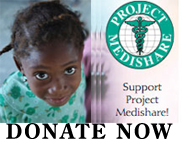
Co-founder of Project Medishare and a physician at the Jackson Memorial Hospital in Miami, Dr. Arthur Fournier was among the first doctors to treat patients with AIDS and to recognize the socioeconomic forces driving the epidemic. In The Zombie Curse: A Doctor’s 25-year Journey into the Heart of the AIDS Epidemic in Haiti, Dr. Fournier offers his memoir regarding his dedication in battling the AIDS epidemic in Haiti and how he, along with dedicated colleagues, founded Project Medishare for Haiti, Inc.
This book does more than chronicle the story of a horrible disease, it also tells the history of how Project Medishare began serving the people of Haiti. The Zombie Curse would make a great gift this holiday season!
“Fournier sends out a cry from the front lines about the overwhelming role poverty plays in the spread of AIDS. His awakening came in the early 1980s when, as a faculty physician at the University of Miami Medical School, he saw AIDS spreading through the city’s Haitian population. He tells stories of patients—men, women and children—with clear signs of AIDS (believed at that time to be a disease of gay men and drug users) and how they were stigmatized by medical personnel. The author became completely committed to understanding this illness, and with supportive colleagues he traveled many times to Haiti and co-founded Project Medishare, devoted to improving Haiti’s health-care system. He was especially successful in the town of Thomonde, establishing an initiative to train physicians and nurses. Fournier offers brutal descriptions of the poverty that fuels AIDS in Haiti, a country where malnutrition reigns, young women are forced into prostitution and orphanages abound.”
—Publisher’s Weekly
This book would make a great gift to anyone who has volunteered with Project Medishare or anyone who is interested in the organization’s efforts in Haiti. The hardcover book can be purchased for $27.95 or order an autographed copy for $50.
All proceeds from each book purchased through Project Medishare’s online store will go to benefit Project Medishare’s efforts to improve the healthcare infrastructure in Haiti. Click here to order your online copy today!





